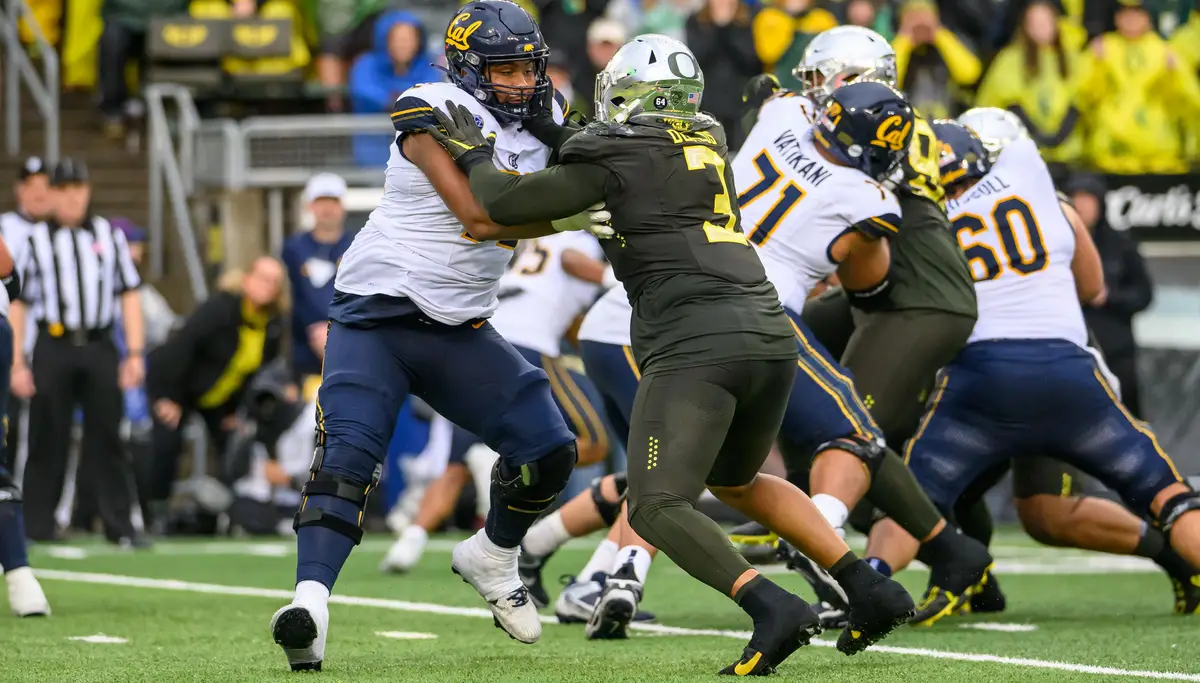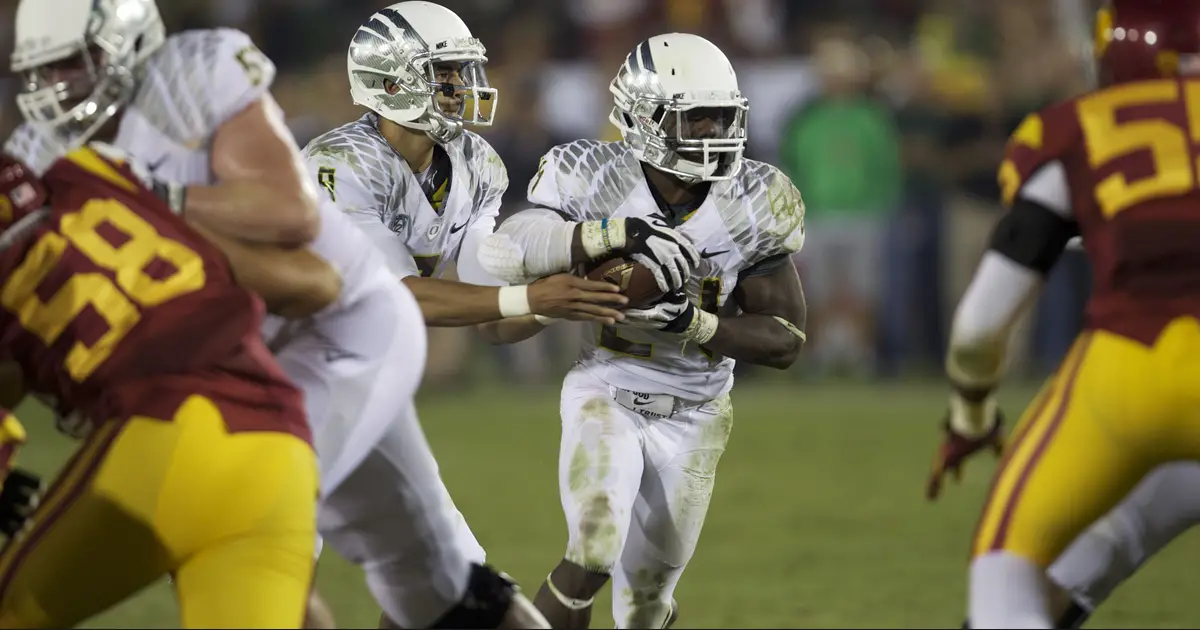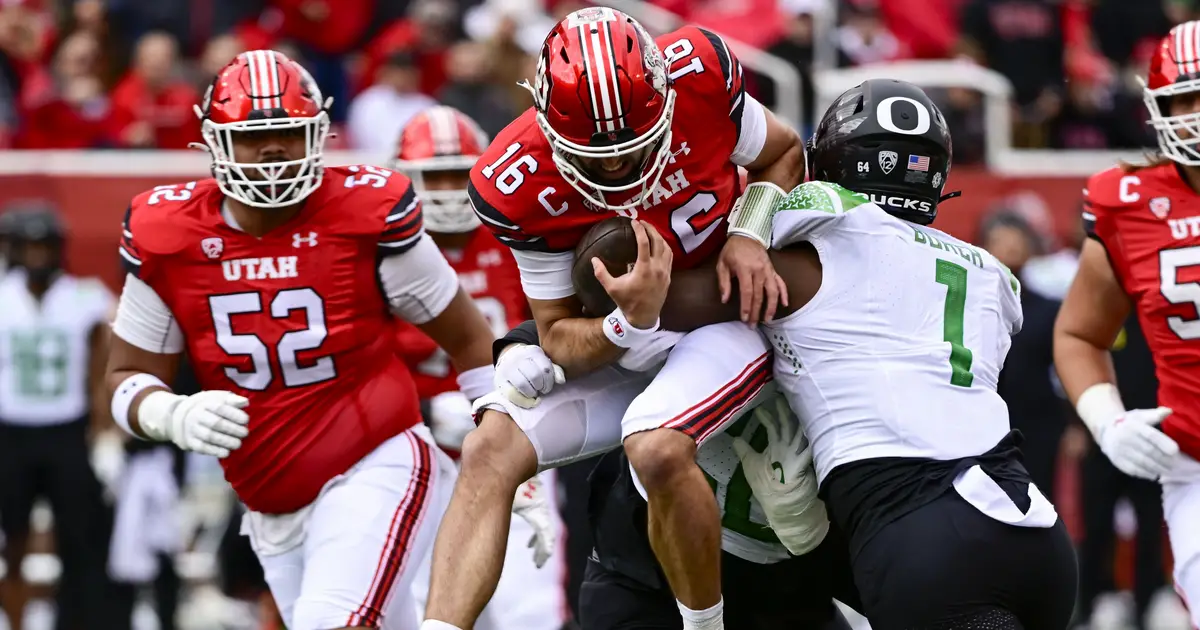USC has a very good offense, and they have needed it, as their defense as been nonexistent this year. With Caleb Williams and receivers like Brenden Rice, Tahj Washington, Mario Williams and Zachariah Branch, it’s easy to see why USC has one of the most feared passing attacks in the country. Mr. FishDuck some time away from his fun on live casino baccarat to discuss his concerns with me about trying to contain the air-offense of Troy.
It is unsurprising that with all this talent, Williams is No. 2 in passing yards this year and USC has the No. 5 overall passing offense. (Oregon is the No. 4 passing offense if you were wondering.) However, USC’s rushing attack only ranks at No. 65.
So why should Oregon fear USC’s run game at all? Their offensive line has been weak the entire year and, though Williams is a threat to run the ball, a good amount of his run threat stems from being able to improvise and take what he sees. So what makes their rushing attack worth stopping when that passing attack is by far their most deadly weapon?
USC’s premier running back, MarShawn Lloyd, averages 7.7 yards per carry. He doesn’t get the ball that frequently, as he only has 99 carries in his nine appearances this year, an average of just over 10 carries per game. He is efficient with his touches, and at 5’9” and 210, he is not easy to bring down. However, at the time of writing this article, it is unclear whether he will play against the Ducks, as he was out with an undisclosed injury last week against Washington.
That leaves USC’s back-up running back Austin Jones, who averages 6.3 yards per carry and can be just as dangerous for opposing teams. What makes these USC running backs dangerous is simple: Given their poor offensive line, most teams are going to put more defenders into coverage to stop the passing game and that leaves too few bodies in the box to stop the run. This is a prime example of the pass game opening up the run game.

Oregon’s defensive line will need to contain USC’s quarterback and rushing attack.
(Photo by Craig Strobeck)
This isn’t a new concept. The Ducks saw many of Mike Leach’s Washington State air raid offenses exploit defenses by sprinkling in a few run plays to take advantage of a lack of defenders at the line of scrimmage.
Is USC’s run game going to run the Ducks off the field? Of course not. If they stick to the ground too much, they’ll play into Oregon’s strength along the defensive line. But it is absolutely critical that the Ducks defensive line contains the run game while also containing Williams in a collapsing pocket. Mobile quarterbacks haven’t been too kind to the Ducks this season, though we have seen significant improvements in that regard in the last few games. Still, Williams is a special talent.
The purpose of the USC run game is to punish defenses for selling out to stop the pass while also making converting on later downs that much easier. Getting even five yards on a first down run means the entire playbook is open for downs two and three. If the defense is going to keep Williams and the USC offense on the sideline, they can’t allow their rushing attack to pick up easy chunk yards.
Training for the Rematch
At this point, it feels like Oregon and Washington are cruising for a rematch in the Pac-12 Championship Game. USC is really Washington-lite at this point, as both teams have great quarterbacks and receivers. As mentioned above, Williams is the No. 2 passer in the country and Washington’s Michael Penix is No. 1. Both teams really do rely on similar concepts offensively, especially in the run game.
The Oregon-Washington game earlier this year was without a doubt the worse planned game from this staff this season. Other articles have already gone over the offensive problems in that game, and the defense was poorly planned as well, even though it arguably did enough to allow the Ducks to win the game.

In 2012, Oregon’s Kenjon Barner ran for a school record against USC. Can Bucky Irving get close tonight?
(Photo by Kevin Cline)
One of the key stats that the Ducks will need to fix for a rematch is Washington’s rushing numbers. Washington’s runningback Dillon Johnson had 20 carries for a total of 100 yards. That doesn’t sound that impressive on the whole, since the Ducks kept the Washington run game around a hundred yards. However, the red flag here is that Johnson ran for five yards per carry against the Ducks.
This means that the Huskies used their run game to exploit the Ducks’ commitment to stopping the passing game. The Ducks did keep Penix below his average yards at that point in the season, but it came at the cost of Washington’s run game getting enough yards on the ground to make for easy third down conversions. This kept the Washington offense on the field.
What has become abundantly clear is that Washington head coach Kalen DeBoer has put an emphasis on his excellent passing game, but he is more than happy to take what defenses give him. And if defenses are giving him room to run, he is going to lean on Johnson. They did just that against USC — the Huskies ran for 316 yards against the Trojans. Granted, the Trojan rush defense is awful, but DeBoer doesn’t care how his team gets the yards or points. He’ll exploit any team willing to sell out to stop his pass game.
Today against USC is an opportunity for Oregon to prepare their defense for a rematch against Washington. The Ducks still have everything to play for and they should keep rolling tonight against the USC Trojans.
David Marsh
Portland, Oregon
Top Photo by Kiffer Creveling
 Andrew Mueller, the FishDuck.com Volunteer Editor for this article, works in higher education in Chicago, Illinois.
Andrew Mueller, the FishDuck.com Volunteer Editor for this article, works in higher education in Chicago, Illinois.
Related Articles:
Ducks Football 2026: Breaking Down Strengths And Weaknesses
These Ducks Will Have Monster Second Seasons as Starters
Oregon Football: Early 2026 Ranking Projections
FishDuck Foaming Over Upside of 2026 Diamond Ducks
Unbelievable...Same SEC Stuff, Different Day
Why Oregon Football Always Belongs in the National Conversation

David Marsh is a high school social studies teacher in Portland, Oregon. As a teacher he is known for telling puns to his students who sometimes laugh out of sympathy, and being both eccentric about history and the Ducks.
David graduated from the University of Oregon in 2012 with Majors in: Medieval Studies, Religious Studies, and Geography. David began following Ducks Football after being in a car accident in 2012; finding football something new and exciting to learn about during this difficult time in his life. Now, he cannot see life without Oregon football.

